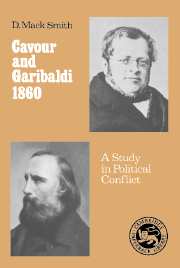Book contents
- Frontmatter
- Contents
- Preface
- Abbreviations
- Introduction
- Chapter I Political opinions in Sicily: April–June 1860
- Chapter II Cavour and the diplomats: April–June
- Chapter III La Farina and Crispi: June
- Chapter IV Arguments for and against annexation
- Chapter V Arguments over ways and means
- Chapter VI Crispi loses the first round: June
- Chapter VII Cavour loses the second round: July
- Chapter VIII Cavour adjusts his policy: July
- Chapter IX Depretis begins his prodictatorship: July
- Chapter X Cavour plans a revolt at Naples: July
- Chapter XI Cavour fails at Naples: August
- Chapter XII Political differences in Sicily: August
- Chapter XIII Cavour forces Depretis to a choice: 1–8 September
- Chapter XIV Depretis fails to persuade Garibaldi: 8–14 September
- Chapter XV Garibaldi succeeds at Naples: 1–15 September
- Chapter XVI Cavour breaks with Garibaldi: September
- Chapter XVII The radicals at bay: September
- Chapter XVIII Mordini the new prodictator: 17–25 September
- Chapter XIX Further controversy over annexation: September–October
- Chapter XX Mordini summons an assembly: 5 October
- Chapter XXI Pallavicino fights for a plebiscite: 8 October
- Chapter XXII Parliament supports Cavour: October
- Chapter XXIII Mordini changes his mind: 9–13 October
- Chapter XXIV Garibaldi makes his decision: 9–13 October
- Chapter XXV The plebiscite in Sicily: October
- Chapter XXVI The doubtful significance of the vote: October–November
- Chapter XXVII Cavour's government in the south: November–December
- Chapter XXVIII Conclusion
- Index
Chapter XVIII - Mordini the new prodictator: 17–25 September
Published online by Cambridge University Press: 30 October 2009
- Frontmatter
- Contents
- Preface
- Abbreviations
- Introduction
- Chapter I Political opinions in Sicily: April–June 1860
- Chapter II Cavour and the diplomats: April–June
- Chapter III La Farina and Crispi: June
- Chapter IV Arguments for and against annexation
- Chapter V Arguments over ways and means
- Chapter VI Crispi loses the first round: June
- Chapter VII Cavour loses the second round: July
- Chapter VIII Cavour adjusts his policy: July
- Chapter IX Depretis begins his prodictatorship: July
- Chapter X Cavour plans a revolt at Naples: July
- Chapter XI Cavour fails at Naples: August
- Chapter XII Political differences in Sicily: August
- Chapter XIII Cavour forces Depretis to a choice: 1–8 September
- Chapter XIV Depretis fails to persuade Garibaldi: 8–14 September
- Chapter XV Garibaldi succeeds at Naples: 1–15 September
- Chapter XVI Cavour breaks with Garibaldi: September
- Chapter XVII The radicals at bay: September
- Chapter XVIII Mordini the new prodictator: 17–25 September
- Chapter XIX Further controversy over annexation: September–October
- Chapter XX Mordini summons an assembly: 5 October
- Chapter XXI Pallavicino fights for a plebiscite: 8 October
- Chapter XXII Parliament supports Cavour: October
- Chapter XXIII Mordini changes his mind: 9–13 October
- Chapter XXIV Garibaldi makes his decision: 9–13 October
- Chapter XXV The plebiscite in Sicily: October
- Chapter XXVI The doubtful significance of the vote: October–November
- Chapter XXVII Cavour's government in the south: November–December
- Chapter XXVIII Conclusion
- Index
Summary
By the middle of September, Italian affairs in general were driving on at what Lord Palmerston called ‘railway speed’, but the island of Sicily seemed to have been left in something of a backwater, and Sicilian politics had again taken on the appearance of being more local than national. As a French observer in the south commented on 18 September, ‘on ne semble être d'accord en Sicile que sur un seul point, la haine du nom napolitain, et de tout lien politique, même abstrait, avec ce royaume’. Apart from this one point of agreement, Sicilians were becoming ever more restless and anxious as the battle moved farther away. Depretis's attempt to find a highest common factor of consent had ended in his resignation on the 14th. As a result of this, Garibaldi had most reluctantly to leave his military preoccupations in order to come and repair these growing differences. On the 17th the dictator arrived unexpectedly in Palermo for a six-hour visit, intending to find out for himself what was amiss and to select a new civil governor.
Crispi's candidacy for the vacant prodictatorship was out of the question, since he had aroused too much personal antipathy to be the instrument of pacification, and was too much of a partisan and too little of a diplomat to be able to find a compromise and secure people's consent to it. Before returning to Sicily the dictator had, it is true, asked Crispi to come with him as adviser, but the latter was too much frightened of the changed atmosphere of backbiting and popular demonstrations, and was too eager to remain on the centre of the stage at Naples.
- Type
- Chapter
- Information
- Cavour and Garibaldi 1860A Study in Political Conflict, pp. 261 - 276Publisher: Cambridge University PressPrint publication year: 1985



